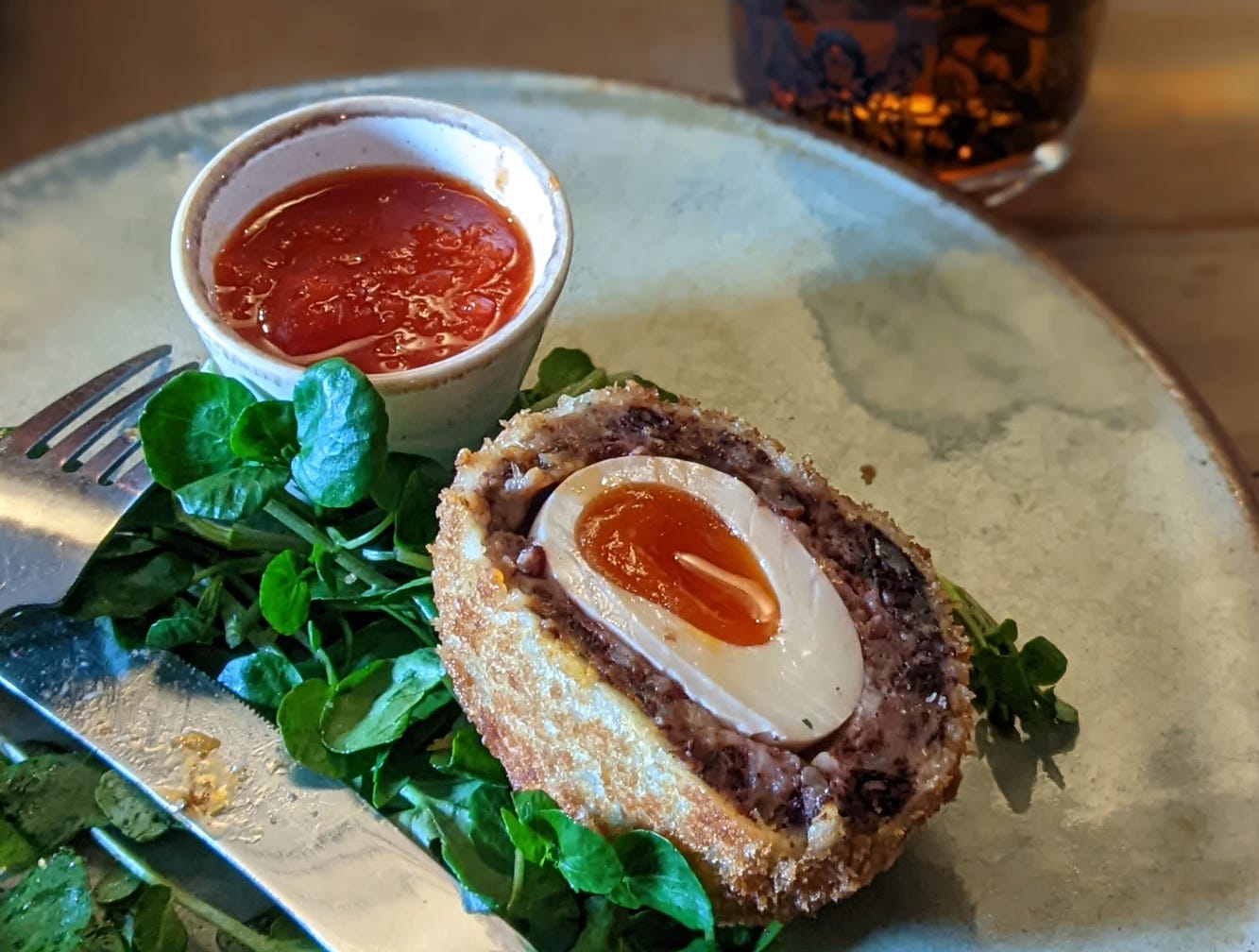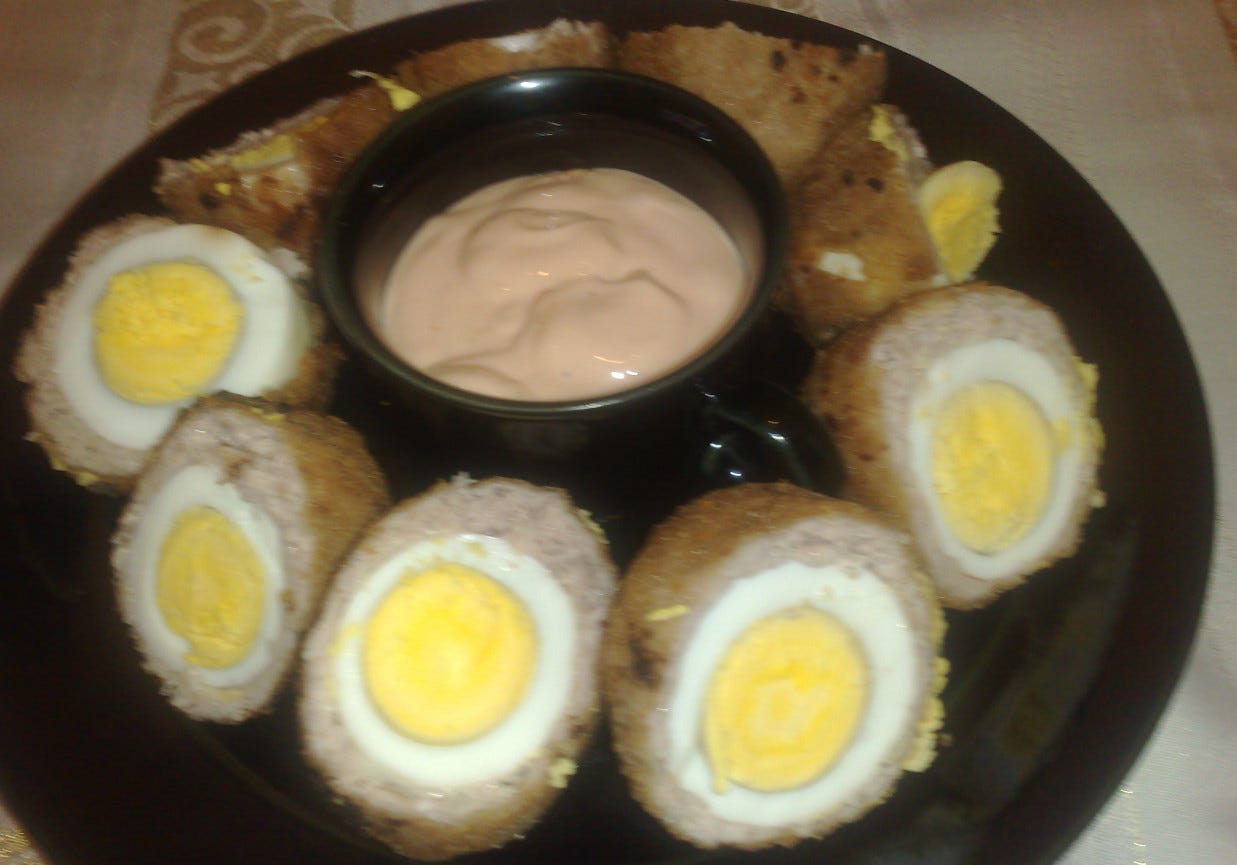The triumph of the Scotch egg
Britain's guiltiest culinary pleasure is now firmly cemented in our hearts
THERE HAS been no greater revolution in the culinary world over the past five-or-so years than the transformation of the Scotch egg from anaemic petrol-station fodder to the soignée habitué of every gastropub in the British Isles.
And even though the Scotch egg has become sophisticated – such as this handsome example produced at my excellent local pub – it is still the object of much jocularity. As with any social climber, we may laugh behind the back of the Scotch egg as it tries to hide its vulgar and humble roots, and yet we also must acknowledge its innate charisma and succulent qualities that have seen it climb as far as it has. A mere joke of a food would have eventually outstayed its ironic welcome, but we can be certain that the Scotch egg is now a permanent fixture on our tables, picnic rugs – and in our cars.
For the Scotch egg is truly a survivor. For centuries, it was derided as one of the most shameful constituents of British cuisine – an unsophisticated embarrassment that should have been permanently dispatched to the food bin, along with tripe and jellied eels. Yet the Scotch egg has survived many onslaughts, and is fast becoming the nation’s favourite savoury snack, perhaps soon to overtake the pork pie and the sausage roll.
As with all legends, the origins of the Scotch egg are obscure.
While some maintain they hail from Scotland – naturally – there is a school of thought that confidently states, like that other guilty pleasure the Chicken Tikka Masala, that they are an import from India. And then there is the posh London grocers Fortnum & Mason, who claim it was their invention back in 1738. Hmmmmm.
What we do know is that crumb coating is a relatively new feature. Note here the lack of crumbs in this recipe from The Housekeeper’s Magazine & Family Economist of 1826 – but also the highly suspect addition of gravy.
But Scotch eggs aficionados – eggoistes? – would be even more alarmed by this recipe found in The Times on 16 February 1945, which featured reconstituted dried eggs. Admittedly, there was still a war on, so in a sense you could say that the Scotch egg was doing its bit to see off Hitler.
Note also how the Ministry of Food described Scotch eggs as ‘that old favourite’ – suggesting their presence in our hearts for perhaps many decades. There’s no doubt that some of us are rightly evangelical about their joys – to the extent that things can go over the top.
Take the tragic story of Siobhan Fyfe, 19, who, in 1979, craved a Scotch egg so much that she lost her job. Mrs Fyfe, who was six months pregnant, had a row with her boss which caused her to throw her Scotch egg at a wall. “I forgot I had it in my hand,” she confessed at an industrial tribunal. A likely tale.
Now is not the time to tell the full story of the Lancashire Asda Scotch Egg Missile Crisis, which would see a 22-year-old man sentenced to a community order for 12 months with a 10-day rehabilitation activity requirement for drunkenly throwing Scotch eggs at a supermarket manager.
Nor it is the place to recount the terrible events of the 2019 Silvery Tay Chip Shop Bust-Up, in which a fight broke out in a Newport chippie over a request for a nearly out-of-date Scotch egg to be heated, even though it had been bought from the local Co-op. Over these tragic events a curtain must be drawn, lest we bring the Scotch egg into disrepute.
But what does bring the Scotch egg into disrepute are its filthy foreign imitators. Just look at these examples, and quail at their horridness. The first is from Alaska, where it appears not only the climate is cold and grey.
And while the nargisi kofta from India is said to have inspired the Scotch egg, if you find the idea of drowning a vulnerable Scotch egg with curry sauce an appealing prospect, then you’re drunk.
And finally, just take a look at jaskółcze gniazda from Poland. They may look a bit more like the real thing, but don’t be seduced. They are horribly let down by the mandatory inclusion of (supposedly) fresh horseradish cream sauce.
I think we can be confident that these imitators will not invade our shores any time soon. There is no doubt that the homegrown Scotch egg will always triumph, and its place in our hearts is assured. Indeed, so entrenched is it there, that it also has a regular roll-on-part in some of our finest comedies.
If you substitute the Scotch egg in these sketches for any other form of savoury treat – such as a pork pie – then the comedy surely disappears.
Alan: Can you smell my breath?
Lynn: It smells a bit like gas.
Alan: You know what that is, don’t you?
Lynn: No?
Alan: It’s those scotch eggs we had at the petrol station last night.
If there’s a wrong moment to tuck into a Scotch egg, then you can always rely on Keith…
How else do you wean Super Hans off crack?
Finally, I want to leave you by starting a debate about how we should eat our favourite delicacy. For just as when you bisect a Scotch egg and get two opposing halves, so too is the world of Scotch egg appreciation hopelessly divided.
Please consider these important questions, and I’d love it if you shared your thoughts below.
Should the yolk be runny or hard?
Should the meat be pure, or adulterated with substances like chilli?
How do you eat them? Cut in two, or bitten into like an apple? Should one ever quarter a Scotch egg?
Should they be accompanied with some other food? And if so, what? Or should they stand proudly alone?
Hot or cold?
Is a Scotch egg merely a snack, or can it ever be a meal in itself?
What do you drink with a Scotch egg? Surely it has to be beer? But if wine, red or white? Dry or medium?
Whatever your answer, I am sure we can all agree that the Scotch egg is the finest food ever created. And if you’ve yet to have one, then you are in for a treat – and an addiction that will last a lifetime.













Living in France, scotch eggs are not generally available. I made some last year which I thought were successful. Eggs laid by our own chickens, hard boiled ( only just), minced pork meat seasoned with pepper and herbs de Provence and bound with an egg, home made bread-crumb coating. Eaten tepid if possible, halved, with salad, rosé wine or beer, would be my preference. And they are perfect picnic food like Arancini!
I should be working on my literature review so this is a welcome excuse to procrastinate. I've had three exemplary Scotch eggs fairly recently: at the Compasses at Chicksgrove, The Old Ale House in Salisbury, and best of all at The Havelock in Brook Green (though I may just have been hungriest when I had that one). A nice, slightly runny yolk is always a good sign. An IPA to wash it down. Perfect.